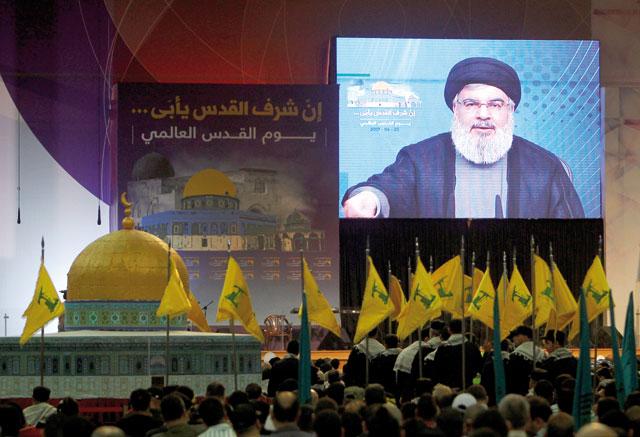You are here
Hizbollah vows response to ‘Israeli air strike’
By AFP - Feb 26,2014 - Last updated at Feb 26,2014
BEIRUT — Hizbollah on Wednesday threatened to retaliate after Israel’s first reported air raid targeting a position of the Lebanese Shiite movement since a 2006 war.
The statement comes two days after Israeli warplanes struck a Hizbollah position in eastern Lebanon, amid fears that the region may be dragged into further conflict.
“On Monday night... the Israeli enemy’s warplanes bombarded a Hizbollah position on the Lebanese-Syrian border, near the area of Janta in the Bekaa Valley” of eastern Lebanon, Hizbollah said.
Wednesday’s statement was the group’s first admission that it had been the target of the raid, although Lebanese sources had previously reported the attack.
“This new attack amounts to blatant aggression against Lebanon, its sovereignty and territory,” the militant group said, adding that “it will not stand without a response from the Resistance, which will choose the appropriate time, place and means.”
Hizbollah said: “This aggression did not, thank God, cause any deaths or injuries. There was only some material damage.”
The movement’s backer Iran also said the movement had the right to respond.
Hizbollah, which brands itself a resistance movement against Israel, was formed in 1982 by Iran’s Revolutionary Guards and was the principal actor in ending Israel’s occupation of southern Lebanon in 2000.
Hizbollah is Lebanon’s only movement that has not disarmed since the small Mediterranean country’s brutal 15-year civil war ended in 1990.
It has bases in the south of Lebanon, the Bekaa Valley in the east, and in its southern Beirut bastion.
The group denied earlier reports that Israel’s raids had hit “artillery positions or missiles”.
On Monday night, a Lebanese security source told AFP two raids had hit a Hizbollah target near the Lebanese-Syrian border.
Hizbollah’s Al Manar television channel had denied any raid had hit Lebanese territory.
On Tuesday, Israeli officials refrained from commenting specifically on the raid, although they confirmed a policy of interdiction of suspected arms deliveries from Syria to Hizbollah.
“We are doing everything that is necessary in order to defend the security of Israel,” Israeli Prime Minister Benjamin Netanyahu said.
“We will not say what we’re doing or what we’re not doing.”
Meanwhile in Damascus, Alaeddin Boroujerdi, who chair’s Iran’s parliament committee on foreign policy and national security, echoed Hizbollah’s threat to retaliate.
“I think the resistance [Hizbollah] knows its lesson well and how it should behave,” Boroujerdi told reporters.
“There is no doubt whatsoever... that it was the Zionist entity that started in this game, and Hizbollah maintains the right to respond... and there is no doubt that the Zionist entity’s losses will multiply,” he added.
It was the first Israeli attack against Hizbollah in Lebanon since their 2006 war that killed more than 1,200 Lebanese, mostly civilians, and some 160 Israelis, mostly soldiers.
Hizbollah acknowledged last spring that it is sending fighters into neighbouring Syria to support President Bashar Assad’s forces as they battle a nearly three-year uprising.
According to Waddah Charara, a sociology professor and author of “The State of Hizbollah”, the raids could mark an important turning point.
Now “Israel can attack Lebanon because it knows there will be no reaction at the national level,” Charara said.
The movement enjoyed widespread support in Lebanon during the 2006 conflict with Israel, but its popularity has diminished in recent years, and its decision to intervene in the Syrian conflict is controversial.
Syria has long provided arms and other aid to Hizbollah, and also served as a conduit for Iranian military aid to the movement.
Related Articles
Israel’s army said Wednesday it struck two Hizbollah fighters as they were planting a bomb near the Israeli-Syrian frontier, a week after an air raid against the group inside Lebanon.
An Israeli strike on Syria killed an Iranian general, Tehran confirmed Monday, as thousands of supporters of Lebanon's Hizbollah gathered to bury one of six fighters killed in the same raid.
OCCUPIED JERUSALEM — Israel said on Tuesday that the Hizbollah guerrilla group, its most potent enemy in neighbouring Lebanon, had gained co

















